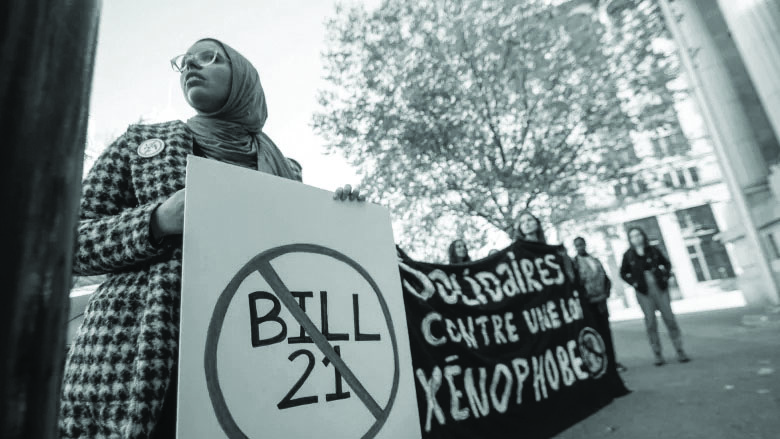Nov. 16 marked the final day of hearings against Bill 21 at the Court of Appeal of Quebec in Montreal. The legislation has faced controversy because it prohibits people employed in the public sector from wearing visible religious symbols at work and preemptively invoked the notwithstanding clause. Over five non-consecutive days, civil liberties groups, including the Canadian Civil Liberties Association (CCLA) and the National Council of Canadian Muslims (NCCM), argued against an April 2021 decision by the Superior Court of Quebec that upheld most aspects of the Bill.
Among those protesting outside the courthouse on Nov. 7, when the hearings began, was the McGill Coalition Against Bill 21, which is composed of students, staff, faculty, and other McGill community members who oppose the law.
The 17 groups challenging the Bill argued that the Coalition Avenir Québec (CAQ)’s use of the notwithstanding clause―section 33 of the Canadian Charter of Rights and Freedoms―was invalid. The notwithstanding clause allows Parliament and provincial legislatures to shield legislation from any provisions in sections 2 (fundamental freedoms) and 7 through 15 (legal rights and equality rights) of the Charter. Plaintiffs opposed Bill 21 on the grounds that the notwithstanding clause does not protect the Bill against section 28 of the Canadian Charter of Rights and Freedoms, which guarantees equality between the sexes.
Elizabeth Elbourne, a professor in the department of History and Classical Studies at McGill, is “deeply troubled” by the invocation of the notwithstanding clause, and hopes to see the court acknowledge the effects the Bill has on women, in particular.
“It would be good to hear a ruling on gender grounds, that it had a disproportionate impact on women, and that there is, therefore, a ground which would exempt [the Bill] from the purview of the notwithstanding clause,” Elbourne said in an interview with The McGill Tribune.
She added that she has witnessed the ramifications of Bill 21 herself at McGill.
“I had a student who was going to do a [master’s degree] with me, and who withdrew and left Quebec as a result of the law,” Elbourne said. “I met a student last month who used to wear [a] hijab and had to stop because of the law, but found it a very difficult and upsetting decision.”
Ehab Lotayef, a systems manager at McGill’s Department of Electrical and Computer Engineering and a member of the McGill Coalition, believes that the language used in Bill 21 inordinately targets Muslim women.
“The word symbol is very misleading [….] A Muslim man, for example, can wear certain necklaces or chains with a certain symbol. That is very optional, that’s what a symbol is,” Lotayef said in an interview with the Tribune. “But when a Muslim woman is covering her hair, she does not consider that […] an option, or consider that a symbol.”
A study conducted under the leadership of Maryse Potvin from L’Université du Québec à Montréal (UQÀM) surveyed the effects of Bill 21 on education faculties. Bronwen Low, a McGill associate professor of integrated studies in education and a member of Potvin’s team, shared some of their findings with the Tribune.
“Although the [Bill] is not to affect student teachers, findings from among the 972 survey respondents associate [Bill] 21 with negative and discriminatory treatment of student teachers, more polarized and conflictual interactions in university classrooms, and negative effects on the well-being and academic and professional achievement of students,” Low wrote.
The ramifications of the Bill extend beyond unpleasant classroom environments. Ghania Javed, U3 Arts and Arts Undergraduate Society (AUS) president, recalled conversations with students who fear Bill 21’s potential detriment to their future careers in Quebec.
“I heard from one student that she’s considering going to Ontario after graduating from McGill Law because she’s not sure if by the time she will be practicing law, the Bill will [still] be here,” Javed told the Tribune. “Obviously if you want to work for the government, you have to choose between your career and wearing a religious symbol.”









It continues to be a challenge to live in Quebec as an anglophone person (who speaks French too) but here we are…